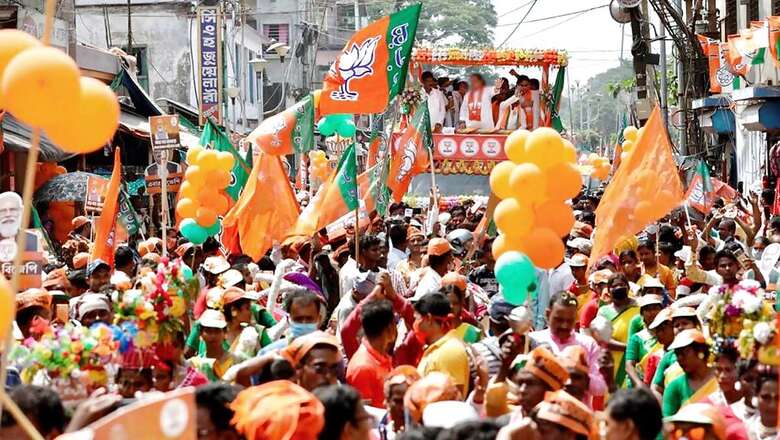
views
The Bharatiya Janata Party has gone all out to win the politically and ideologically significant state of Bengal and in the process unseat two-term chief minister Mamata Banerjee and her Trinamool Congress. It’s a prestige battle that the BJP wants to win at any cost, say analysts, and that has been evident in the no-holds-barred campaigning for the assembly polls with the final round of voting on Thursday and counting on May 2. The saffron party and its associates have reached out to various marginalised sections including Dalit groups, Matuas, Rajbongshis, tea garden workers, tribals and as many diverse caste and cultural identities as possible. This has been made possible to a large extent by a string of BJP leaders, mostly from underprivileged communities themselves, who have specifically focused on pursuing these groups.
Jyotirmay Singh Mahato
Jyotirmay Singh Mahato is a BJP Lok Sabha MP from Purulia district in West Bengal. In the 2019 Lok Sabha elections, he defeated Trinamool Congress MP Mriganko Mahato by over 2 lakh votes. He is also one of the general secretaries of the West Bengal unit of the BJP since June 2020 and is a well-known face in the Dalit community of Bengal.
His contribution in consolidating Dalit voters in favour of BJP in the Jangalmahal region was widely appreciated by the party central leadership, sources say. It is believed that he is the man who shaped a wave in favour of Prime Minister Narendra Modi in that region, which helped the BJP to win 18 of the 42 seats on offer in Bengal in the 2019 Lok Sabha polls.
Mahato joined the Akhil Bharatiya Vidyarthi Parishad, which is the student wing of the Rashtriya Swayamsevak Sangh, in 2000, and was an active student leader till 2010. He later became a Youth BJP member and in 2016 fought the assembly polls, standing third. In 2019, as a BJP general secretary, he contested the Lok Sabha polls and won.
Mahato is a law graduate from Rourkela Law College (Sambalpur University) in Odisha. On September 13, 2019, he was appointed a member of the parliamentary standing committee on personnel, public grievances, law and justice. He is also a member of the committee on subordinate legislation and a consultative committee member of the ministry of youth affairs and sports.
Those who know him say the 35-year-old, who is a bachelor, is an avid reader and loves football.
On being asked once when he was planning to get married, Mahato laughed and said, “Desh seva (serving the country) is my priority.”
Khagen Murmu
Khagen Murmu is a BJP MP from Malda North in West Bengal. He served for four terms as an MLA from the Habibpur constituency in Malda as a member of the Communist Party of India (Marxist) from 2006 to 2019.
Murmu is a Santhali leader, a dominant tribal community in Bengal’s politics.
In 2019, he joined the BJP and subsequently was elected to the Lok Sabha.
He completed his graduation in Bachelor of Arts from Magadh University in Bihar. In 1993, he became a member of the Malda Zilla Parishad and held the position till 1998.
In 1998, he became the vice president of the Malda Zilla Parishad.
As a Lok Sabha lawmaker, the 61-year-old is a member of the standing committee on food, consumer affairs and public distribution and also a member, consultative committee, ministry of Jal Shakti.
Murmu married Manju Kisku in 1985. The couple have three sons and a daughter.
Arun Haldar
Arun Haldar has been a national secretary of the BJP’s National Scheduled Caste Morcha. Insiders say that for the past 34 years, the veteran has extensively worked for the BJP to strengthen its base in Dalit-dominated areas of North 24 Parganas, Nadia district and entire North Bengal. He was also a national executive member of the BJP.
Haldar’s contribution towards the party in consolidating Dalit votes in Bengal is significant, say analysts. He joined the BJP in 1987 when Tapan Sikdar was the state unit president.
Prior to the BJP, Haldar was a leader of the Left-wing Students’ Federation of India, but he decided to join the RSS after being impressed by Sangh leader Dr Shiv Prasad Roy. He used to run two shakhas at Haroa in the North 24 Parganas district.
In 2009, he contested for the post of councillor in the Barasat municipal election but was defeated. In 2011, he contested the assembly polls from the Bongaon South seat but lost to the TMC.
From 2013 to 2019, he was the state president of the BJP SC Morcha and mobilised Dalit youths in favour of the party. His hard work yielded results in the 2019 parliamentary elections as the BJP made deep inroads into the Dalit community.
Considering his immense contributions in the party, he was appointed deputy chairman of the National SC Commission in February 2021.
Shantanu Thakur
Shantanu Thakur is an influential Matua ‘dharma guru’ and BJP Lok Sabha MP from the Bongaon seat since 2019. He is actively involved in spreading the thoughts and idealism of the Matua culture all over India over the past 20 years as a leader of the All India Matua Mahasangha.
Thakur is the son of former Bengal minister Manjul Krishna Thakur, who was in the TMC. He has an advanced diploma in hospitality management from Victoria University in Sydney, Australia.
Since September 13, 2019, he has been a member of the parliamentary standing committee on commerce and member, consultative committee, ministry of rural development and ministry of Panchayati Raj.
Thakur has helped the BJP create a strong platform in Matua-dominated areas of Bengal. Due to his hard work, the party managed to win most of the seats with heavy Matua influence in the 2019 general elections.
BJP supporters say that for decades, political parties like the Congress, CPI(M) and TMC looked at Matuas only for electoral gains till Narendra Modi’s ascent to power, and since then he has worked towards solving their pending citizenship issue.
Knowing the resentment among the people over the matter, Thakur actively cultivated the citizenship issue to convince the Matuas to support the BJP. In the 2019 Lok Sabha polls, he defeated Trinamool Congress heavyweight Mamata Thakur from Bongaon in North 24 Parganas.
However, analysts say, this time the BJP has lost some ground as Matua leaders are expressing their resentment over delay in the implementation of the Citizenship Amendment Act (CAA).
Saumitra Khan
He is one of the more flamboyant and heavyweight politicians in Bengal.
Such was his charisma, supporters say, that when Bengal embraced ‘Poriborton’ (change) in 2011 under the leadership of Mamata Banerjee, he managed to win the Kotulpur assembly seat in Bankura as a Congress candidate.
At the time the TMC was in alliance with the Congress, but his immense popularity at the grassroots level helped him secure the seat on his own, say observers.
Even when he was prevented (due to a pending police case) from entering Bankura by the Calcutta High Court, he managed to win the Bishnupur Lok Sabha constituency in 2019 by a margin of 78,047 votes without holding any roadshow or addressing any political rally.
Khan officially joined the BJP in January 2019 after leaving Mamata’s team while back. Over the past three years, Khan, who himself belongs to the SC community, has worked extensively to mobilise Dalits in favour of the BJP.
Though he left the TMC over some differences of opinion with some party leaders, he has said on occasions that he still has high regard for “Didi” (Mamata) as he believes in “basic political courtesy” irrespective of political colours.
A college dropout, Khan’s entry in politics began with his movement in 2007-2008 against rash driving by truck drivers and illegal lorry parking along the roadside at Durlabhpur in the Bankura Sadar subdivision.
At the time he was the office secretary of a local club Mitali Sangha in Durlabhpur and was worried about the rising number of road accidents in the area.
His work for Dalits drew the attention of Mamata Banerjee. He joined the TMC but then moved to BJP in 2019 and has helped the saffron party expand its base in SC-dominated areas of South Bengal.
Read all the Latest News, Breaking News and Coronavirus News here. Follow us on Facebook, Twitter and Telegram.













Comments
0 comment